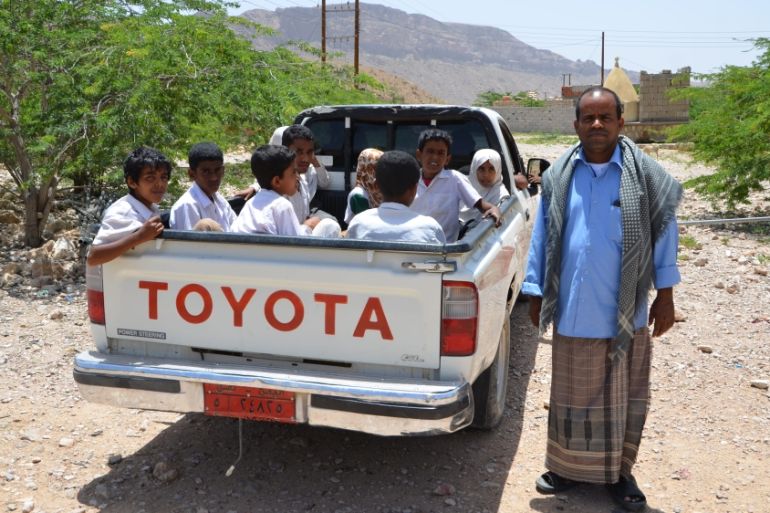Meet the man using Facebook to help Yemen’s destitute
Since 2011, Salim Omer Baras has raised more than $100,000 for the needy in the Arab world’s poorest country.

Mukalla, Yemen Last year, Iman Ibrahim’s mother and siblings, fearing the Houthi rebel group’s rapid advance into southern Yemen, fled by boat to Somalia.
“She found herself trapped in Somalia … I contacted relatives here and asked them to help me,” said Iman, who lives in a small house in the impoverished suburbs north of the port city of Mukalla. But her relatives turned her down, saying they were unable to help.
“One day, my former classmate told me that a man called Salim Omer Baras was famous for using social media networking sites to raise funds for the needy who approach him,” she said. “I reached out for his contact.”
READ MORE: Yemen revolution – ‘Our dream was sold’
Baras has become known in Mukalla for using social media networks, mainly Facebook, to collect thousands of dollars to help critically ill people, hungry families and those in need of life-saving surgery. Th e aid goes to destitute people in Mukalla and neighbouring regions.
Baras, 42, told Al Jazeera that he has raised more than $100,000 in charitable donations since 2011. He recalled that this January, Iman visited him in his home, and explained her family’s ordeal in Somalia. “I posted her appeal online and asked for $2,310 [the total cost of the journey] to help her family return home. Some people from Saudi Arabia privately contacted me and agreed to donate half of the money.”
To raise the remaining amount, Baras wrote another post, urging followers to help the troubled family. “Hours after posting the appeal for the second time, another man offered to pay more than $1,000,” he explained.
After receiving the funds from local exchange companies, Baras called Iman and told her he would transfer the money to her mother in Somalia. “I could not believe my ears. I was so happy,” Iman said.
Baras, who works as a librarian at a secondary school in Mukalla, said he began raising money on social media in 2011. His first online humanitarian appeal was on behalf of a poor family that was “crammed into a room that had no windows or doors”, he recalled. Baras posted an appeal on Facebook to help the family. Two Saudi philanthropists gave 35,000 Yemeni rials ($140) apiece. “I collected the money and fixed two windows, a door for the toilet, and gave them the remaining money,” Baras said.
His online fundraising is also financing breakfast for as many as 100 students in Mukalla. “One day, teachers at the 14th of October School found out that students who faint during morning queue skip breakfast. Students said they had no food at home. They are hungry.” When he learned about the problem three years ago, Baras asked his followers to support the hungry students. “They generously responded to my appeal. I managed to secure breakfast for the students for years,” he said.
To reassure donors that their money is given to the beneficiaries, Baras scans receipts and poses for photos with those who receive the donations. “People have increasingly trusted me,” he said. “They do not ask for evidence that their donations were given out to the right people.”
READ MORE: Starvation in Yemen – ‘We are hoping just to survive’
Amid Yemen’s ongoing war , Baras said, requests for aid have increased, especially among residents who have lost their jobs. He does not post all requests that he receives, but rather scrutinises each case and posts the most needy. “I give priority to those cases that I can verify personally,” he added.

Baras, a father of three children, said he does not own land, a house or a car. His wife is a teacher. Most of Baras’ donors are from Saudi Arabia and the United Arab Emirates, he said, while others come from Europe, Africa and North America. He said he was considering turning his online humanitarian campaigns into a registered foundation, in order to be able to receive larger donations.
In the meantime, his charitable work continues as usual. Last week, a poor nomad from a remote area in Hadramout asked Baras to help him to buy a tent to settle down in a remote area. “The man was visually impaired,” Baras recalled. “I told him, let’s treat your eyes first and then buy you a tent.”
Soon afterwards, Saudi donors agreed to pay for an eye operation for the old man, and Baras took him to a hospital in Mukalla. “He got more than he expected,” Baras said.